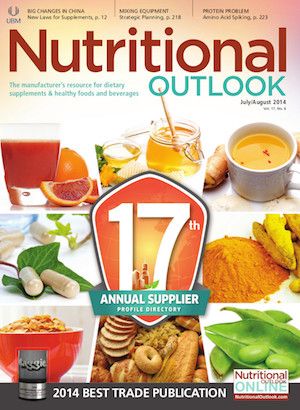Equipment for Controlling Food Contamination
Protecting the workplace gets easier with modern accessories for health product manufacturing.

Barring the unlikely event that your manufacturing plant is totally foolproof, keeping things contamination-free is an ongoing process. In an increasingly global marketplace, there is always a risk of contamination in the workplace, and manufacturers should never settle for a risk to the health of their end-use customers.
From protecting the ingredients themselves to the surfaces they land on, a little investment in sanitation can go a long way. And simple accessories can do a world of good.
Metal Detection
The large tablet and capsule machines that sit inside of dietary supplement factories run on a lot of power and a lot of metal. Companies that make these machines offer warranties, repairs, and even routine check-ups because wear and tear is a likely occurrence over time. The frightening risk with these and other processing machines, such as millers, is flaking metal, and no one wants that getting packed inside of finished goods.
As a safety measure for tablets and capsules specifically, Mettler-Toledo LLC (Columbus, OH) is introducing a Tablex Pro metal detector that can fit onto any tablet or capsule press.
“The metal detector uses radiofrequency to detect metal,” says Oscar Jeter, national sales manager for Mettler-Toledo’s Safeline detection systems. “It creates a small magnetic field which will be disturbed if metal is present in a tablet (or capsule). The system detects that disturbance and rejects the tablet as contaminated.”
Where some metal detectors may be intended for just sample batches, the Tablex Pro can be used non-stop for 100% product inspection. It eliminates the need for additional product inspections later on, and for that reason it may provide cost savings. At just 145 pounds and sitting on caster wheels, this inspection metal detector is mobile for easy transport and cleaning.
Boot Scrubbers
Strangely enough, the debris on one’s shoes can give rise to product contamination, especially if workers are moving between production areas where ingredients must be kept separate. For these chance occurrences, boot and shoe scrubbers have a legitimate purpose in manufacturing plants.
Boot and shoe scrubbers are mechanized machines that are available in a variety of sizes and styles, with some even accomodating tall boots through the use of automated side brushes. These scrubbers can remove pathogens such as Salmonella or E. coli, and they can do away with potential allergens. They present a wise investment for companies that produce products both with and without allergens under the same roof.
Boot and shoe scrubbers aren’t required under current food safety laws, but their use may help companies achieve independent food safety certifications. One of the latest developments in this category is the XBW scrubber from Meritech (Golden, CO). This high-volume, walk-through machine can handle up to seven pairs of feet per minute.
Test Kits
The most scrupulous of manufacturers will want to consider using test kits on their ingredient shipments and any of their shared manufacturing surfaces. A variety of test kits are available for detecting countless potential contaminants, including pathogens and food allergens that should not be present.
This August, FDA begins strictly enforcing gluten levels on products making gluten-free claims, so related manufacturers ought to consider purchasing gluten test kits. Now available from Emport LLC (Pittsburgh), these handy little test strips can detect gluten traces in ingredient batches and even on manufacturing surfaces. There’s nothing worse than an accidental gluten trace in a batch of another ingredient, or traces of gluten left on what should have been a properly cleaned manufacturing surface.
Other test strips and similar devices can answer virtually every other need of a manufacturer-some even check water quality for unwanted microbes. For the manufacturer who wants this variety without an assortment of devices, Hygiena’s (Camarillo, CA) EnSURE test kit presents a viable option.
Regardless of the contaminant, a sanitation equipment supplier is available to meet just about every manufacturer need.
Images courtesy of Meritech, Mettler-Toledo, Emport LLC, and Hygiena.

Prinova acquires Aplinova to further increase its footprint in Latin America
April 7th 2025Prinova has recently announced the acquisition of Brazilian ingredients distributor Aplinova, which is a provider of specialty ingredients for a range of market segments that include food, beverage, supplements, and personal care.




















